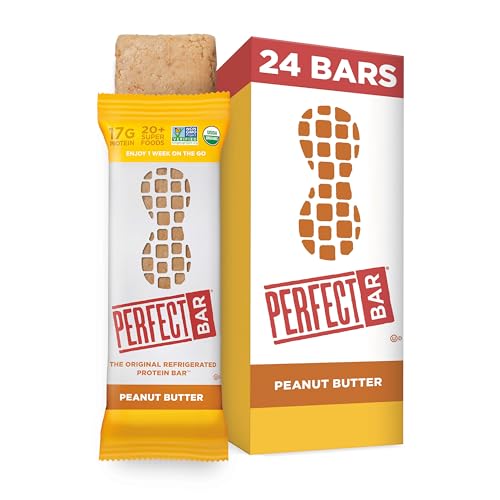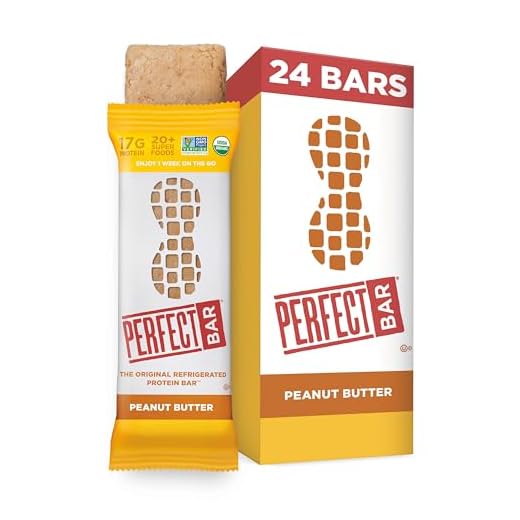

Protein bars have become a popular choice for those seeking a quick and convenient snack that is packed with protein and other essential nutrients. Whether you are an athlete looking to fuel your workouts or simply someone trying to maintain a healthy lifestyle, protein bars can be a great addition to your diet.
But what should you do if you have a surplus of protein bars and not enough room in your pantry? Can you refrigerate them to keep them fresh and extend their shelf life? The answer is yes, you can refrigerate protein bars.
Refrigerating protein bars can help to keep them fresh for a longer period of time, especially if they contain ingredients that are prone to spoilage, such as nuts or nut butters. It can also help to prevent melting if you live in a warm climate or during the summer months.
However, it is important to note that refrigerating protein bars may change their texture and taste. The cold temperature can cause the bars to become harder and chewier, which may not be as enjoyable to eat. If you prefer a softer and more chewy texture, you may want to store your protein bars at room temperature.
Why Refrigerate Protein Bars
Refrigerating protein bars can help to extend their shelf life and maintain their quality. Here are some reasons why refrigerating protein bars is a good idea:
- Preservation: Keeping protein bars in the fridge can help prevent them from spoiling. The colder temperatures slow down the growth of bacteria and molds, which can help to preserve the bars for a longer period of time.
- Firmness: Some protein bars can become soft and mushy at room temperature, especially if they contain ingredients like chocolate or nut butter. Refrigerating these bars can help them maintain their firmness and prevent them from becoming squished or sticky.
- Taste and Texture: Protein bars that contain ingredients like chocolate or caramel can benefit from refrigeration as it helps to prevent them from melting or becoming excessively gooey. Cold temperatures can help protein bars retain their intended taste and texture.
- Convenience: Storing protein bars in the fridge can make them a quick and easy grab-and-go snack option. Chilled bars can be refreshing, especially during warm weather, and can provide a more enjoyable eating experience.
Although refrigerating protein bars is not necessary, it can be beneficial for ensuring their freshness, texture, and taste. However, it’s important to note that not all protein bars require refrigeration, so it’s best to check the packaging or manufacturer’s recommendations.
Benefits of Refrigerating Protein Bars
Refrigerating protein bars can offer several benefits in terms of taste, texture, and shelf life. Here are some of the advantages of keeping your protein bars in the fridge:
|
Improved Texture: Refrigerating protein bars can make them firmer and chewier, enhancing the overall texture. This can be particularly beneficial if you prefer a denser and more satisfying snack. |
|
Enhanced Flavor: Chilling protein bars can help intensify their flavors, making them more enjoyable to eat. The cold temperature can enhance the taste of ingredients like chocolate, peanut butter, or fruit, providing a refreshing and flavorful experience. |
|
Extended Shelf Life: Protein bars stored in the refrigerator tend to last longer compared to those kept at room temperature. The cold environment helps slow down the growth of bacteria and molds, preserving the bars for a more extended period. |
|
Prevents Melting: If you live in a hot climate or plan to carry your protein bars in a bag throughout the day, refrigeration can prevent them from melting. The cool temperature helps maintain the bar’s shape and prevents any unwanted mess. |
|
Refreshingly Cool: Refrigerating protein bars before consuming them can provide a refreshing and cool snack, especially on hot summer days. The chilled bars can offer a respite from the heat and add a pleasant sensation to your snacking experience. |
While refrigerating protein bars can offer various benefits, it’s essential to note that not all bars may require or benefit from refrigeration. Always refer to the manufacturer’s instructions or packaging for specific storage recommendations.
How to Properly Store Protein Bars
Storing protein bars properly is essential to maintain their freshness and quality. Follow these guidelines to ensure your protein bars remain delicious and ready for consumption:
1. Keep in a cool and dry place: Store protein bars in a cool and dry place, away from direct sunlight and heat sources. High temperatures can cause the bars to melt or become sticky.
2. Avoid refrigeration: Protein bars do not need to be refrigerated unless specified by the manufacturer. Refrigeration can affect the texture and flavor of the bars, making them harder and less enjoyable to eat.
3. Check the expiration date: Always check the expiration date on the packaging before consuming protein bars. Consuming expired bars can lead to a loss of nutritional value and potential food safety risks.
4. Seal properly: If the protein bars come in individually wrapped packaging, ensure that each bar is properly sealed after opening. This will help prevent moisture and air exposure, preserving the quality of the bars.
5. Store in airtight containers: If you have protein bars that are not individually wrapped, consider transferring them to airtight containers or resealable bags to maintain freshness. This will also help prevent them from absorbing odors from other foods.
6. Avoid extreme temperatures: Do not store protein bars in areas that are prone to extreme temperature fluctuations, such as near ovens or refrigerators. These fluctuations can affect the texture and quality of the bars.
7. Follow specific instructions: Some protein bars may have specific storage instructions provided by the manufacturer. Always follow these instructions for optimal storage and to maintain the quality of the bars.
By following these storage guidelines, you can ensure that your protein bars are always fresh and delicious, ready for a quick and convenient snack or post-workout boost.
Can Refrigeration Affect Protein Bars
Refrigeration can affect the texture and taste of protein bars. While refrigerating protein bars is generally safe, it can cause some changes to their overall quality.
Protein bars that are stored in the refrigerator may become harder and less chewy. The cold temperature can cause the bars to lose some of their moisture, resulting in a drier texture. This may make them harder to eat and less enjoyable for some individuals.
In addition to changes in texture, refrigeration can also affect the taste of protein bars. The cold environment can alter the flavor and make the bars taste less fresh. Some individuals may find that refrigerated protein bars have a slightly off or stale taste compared to bars stored at room temperature.
It’s important to note that not all protein bars are affected by refrigeration in the same way. Different brands and formulations may react differently to the cold temperature. Some protein bars may maintain their quality and taste even when refrigerated, while others may be more prone to changes in texture and flavor.
| Pros of Refrigerating Protein Bars | Cons of Refrigerating Protein Bars |
|---|---|
| – Extended shelf life | – Potential changes in texture |
| – Prevents melting in warm environments | – Alteration in taste |
| – Keeps the bars firm and intact | – Some bars may become drier |
Ultimately, whether or not to refrigerate protein bars is a matter of personal preference. If you prefer a softer and chewier texture, you may want to store them at room temperature. However, if you live in a warm climate or prefer a firmer texture, refrigeration can help maintain the bars’ integrity and prevent melting.
It’s important to check the packaging or consult the manufacturer’s instructions for specific storage recommendations for each protein bar brand. This way, you can ensure that you are storing and consuming the bars in the best possible way to maintain their quality and taste.
Common Mistakes When Refrigerating Protein Bars
Refrigerating protein bars is a common practice to extend their shelf life and maintain their freshness. However, there are a few mistakes that people often make when refrigerating these bars. It’s important to be aware of these mistakes to ensure that you get the most out of your protein bars.
1. Forgetting to properly wrap the bars: When refrigerating protein bars, make sure to wrap them tightly in plastic wrap or place them in an airtight container. This will prevent moisture from getting in and keep the bars from drying out.
2. Storing them near strong-smelling foods: Protein bars can absorb odors easily, so it’s best to store them away from strong-smelling foods like onions and garlic. This will help maintain the original taste and aroma of the bars.
3. Freezing instead of refrigerating: While freezing protein bars is possible, it can change their texture and taste. If you prefer a softer and chewier texture, refrigeration is the way to go.
4. Overcrowding the refrigerator: It’s important not to overcrowd your refrigerator when storing protein bars. Proper air circulation is necessary to maintain the freshness and quality of the bars.
5. Leaving them in the refrigerator for too long: Protein bars can go bad if left in the refrigerator for an extended period. It’s recommended to consume refrigerated protein bars within a few weeks to ensure their taste and texture are still at their best.
By avoiding these common mistakes, you can ensure that your refrigerated protein bars stay fresh and enjoyable for longer. So, next time you refrigerate your protein bars, keep these tips in mind to get the most out of them!
FAQ
Can you refrigerate protein bars?
Yes, you can refrigerate protein bars. Refrigeration can help to keep the bars firm and prevent them from melting.
What happens if you refrigerate protein bars?
Refrigerating protein bars can help them retain their shape and prevent them from becoming too soft or sticky. It can also increase their shelf life.
How long can you refrigerate protein bars?
You can refrigerate protein bars for up to 2 weeks. Make sure to store them in an airtight container or wrap them tightly in plastic wrap to prevent them from drying out.
Can refrigerating protein bars affect their taste?
Refrigerating protein bars might affect their texture slightly, but it should not significantly impact their taste. They may become slightly harder or chewier when refrigerated, but the overall flavor should remain the same.








